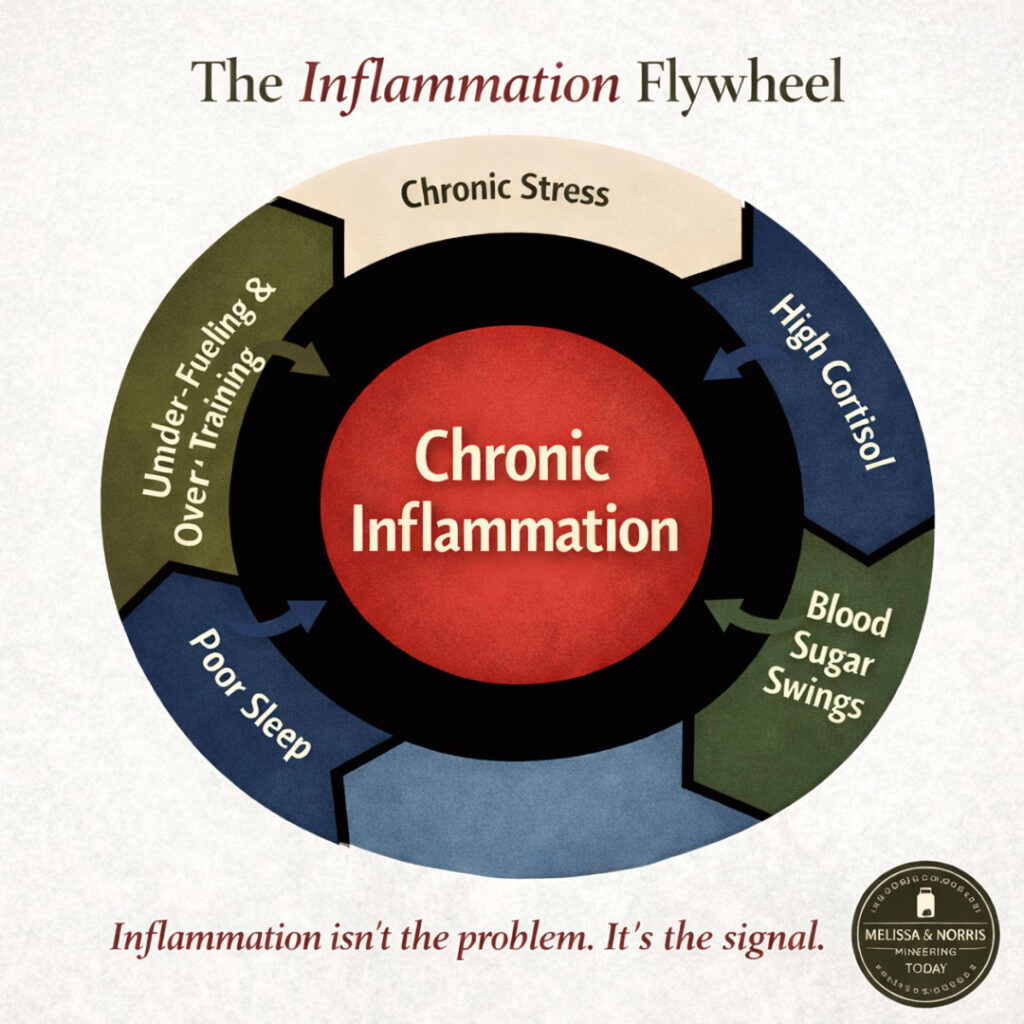Learning how to find your trigger foods or what foods you have sensitivities is life changing. Here’s how to find out what foods are bothering your system, including food testing, what I’m eating now after finding out my results, and if the Ketogenic diet is right for you, all in Part 2 of Healing Your Stomach Naturally!

If you haven’t listened or read Part 1 How to Heal Stomach Acid Naturally , go back and start there as it lays the ground work on the initial healing. I firmly believe that healing is a lifetime affair and has many layers, especially in regards to our stomach, or gut health.
Natural Remedies Made Simple

Start your home apothecary with confidence—even if you’re brand new. Learn how to choose the right herbs for your body using the simple principles of herbal energetics.
Discover how warming, cooling, drying, and moistening herbs affect your body—so you can stop guessing and start making remedies that actually work.
You can catch Part 3 Episode #128 What Happens to Your Body When You Eat Healthy & Cut Out Sugar and Episode #412 The Nourishing Asian Kitchen with Sophia Eng.

The Hidden Cycle Keeping You Inflamed
If you’ve been feeling puffy, tired, achy, or wired-but-tired, this two-page guide will help you understand what may be happening behind the scenes — even if you’re eating “healthy.”
Download the Inflammation Flywheel Guide and learn:
- Where to start so you don’t feel overwhelmed
- The 5 most common drivers that keep inflammation switched on
- Why blood sugar swings, stress, and poor sleep feed each other
Below is episode #127 of the Pioneering Today Podcast , How to Find Your Trigger Foods-Part 2 of Healing Your Stomach Naturally, where we teach families how to grow, preserve and cook their own food using old-fashioned skill sets and wisdom to create a natural self-sufficient home.
It’s important to note that I am not a certified medical practitioner. This post is not intended to diagnose or treat but is for informational purposes only. Please contact your healthcare professional before introducing new herbal and natural remedies into your wellness routine.
Resources
About four years ago I began suffering extreme fatigue and hair loss. For those of you who have my book, Hand Made: the Modern Guide to Made-from-Scratch Living, you’ll recognize this story, and if you don’t have a copy, you’ll want to grab a copy:
Long story short (the long story is in the book) I had hypothyroid (low functioning) and adrenal gland fatigue. With the help of my naturopath and natural thyroid replacement hormone, I was able to get a handle on symptoms. What I didn’t realize at the time thyroid disease is an autoimmune disease.
You may be wondering what this has to do with healing my stomach naturally, but stay with me.
Almost 70% of our entire immune system is in the gut, which is why our gut health is so important to our overall health. (Source)
Though I no longer had the acid reflux and heartburn, I still had some major gut health issues. I’d switched over to a pretty much whole foods and organic diet, but occasionally I’d experience a small amount of heartburn.
Last year, January of 2017 to be exact, I started experiencing a lot of inflammation. I’d gained an extra 10 pounds, which I knew I’d been indulging in Christmas goodies, I tend to have no will power when homemade fudge is sitting on the counter. But, as of January 1st of that year, I went back to eating no sugar and following my normal workout routine.
When I stick to it, this had always worked and the weight would come off. Not this time. I honest to goodness, no cheating involved, did not have any sugar for an entire month. No honey, no maple syrup, nothing, nada, no desserts. But not a pound.
I was experiencing a hard afternoon tiredness, you know that dreaded sleepiness about 2 to 3 o’clock and I also was experiencing a breakthrough period every week… this went on for 4 months straight. For the dudes on here, sorry if it’s too much info, but we’re keeping it real.
Then one day I gained four pounds overnight. I know you can’t gain 4 pounds of fat overnight, this was inflammation and water weight, in a big way. My body was shouting at me again, something was off.
Let me be clear, there is a huge difference between a food allergy and a food sensitivity. I do not have a food allergy, I do tend to be sensitive to certain foods, and there’s a vast difference.
How to find out what your trigger foods are
I’d tried doing elimination diets in the past, that was what had initially helped heal my stomach and get me off the acid reducing meds, but I’d cut out sugar and was still reacting heavily to something. At this point I was plain tired of trying to figure out what it was so I had food testing done.
There are many ways to do food testing.
1.First option and the cheapest (albeit longest route) is to do an elimination diet. Where you cut out suspected common trigger food groups such as:
- gluten
- dairy (lactose or casein intolerant)
- night shades (tomatoes, eggplant, potatoes)
- sugar (honey, maple syrup, coconut sugar, evaporated cane juice, all if it)
- eggs
- soy
- nuts
- corn
- beans/legumes
- citrus fruits
- coffee
Then, after a period of weeks (usually 2 to 4) bring back each of those items one a time to see if you react to them. For more info on elimination diets and food sensitivities click here
2. Skin prick and blood testing, by your doctor or allergist. This will be done by your medical professional. It’s also faster than the elimination diet but many times, you’ll still do an elimination diet with this, and you have the added cost of doctor visits and lab work.
3. Muscle testing, or applied kinesiology (AK for short). Now let me be straight up, there’s a lot of controversy over this. The gist of this testing is having a patient hold the food item (some have you hold it in your hand others do an oral testing) and then testing for muscle weakness in the body, both without the food and then with the food.
There has been some correlated studies done that shows there is some merit to this, such as this study from the US National Library of Medicine National Institute of Health where a pilot study was done on 17 individuals where they were first tested with applied kinesiology muscle weakness testing and then both a radioallergosorbent test and immune complex test where the lab-confirmed 19 of the 21 food sensitivities the muscle testing did.
You’ll also find a great deal of people who think this is just a scam. Each person has to make their own conclusion.
I will say I had the muscle testing done and based on those results, did an elimination diet and with the results of the elimination diet, found it to be spot on for me.
Also important to note, your food sensitivities can change. It’s important we pay attention to our bodies. Some things may bother you now, but after giving your gut time to heal, you may be able to eat in the future, or not. Or maybe things that don’t bother you now will later.
My elimination diet
Based on my sensitivity findings and elimination diet, I found that whey protein powders (even the good ones, totally organic) and I do not get along. I can do homemade yogurt just fine, but not the full whey powder.
The brand of organic raw cocoa powder I was using and I didn’t get along. I switched to a different brand and success!
I can have limited amounts of fresh ground organic spelt, but hard white wheat causes a flare up.

Dairy and eggs are not issues for me. I already new that soy was a huge trigger for me from Part 1. Nightshades don’t bother me. Green beans don’t bother me but I’ve found that shelled beans (even when properly soaked) are best done only occasionally and in small amounts.
What’s working best for me right now
As I mentioned, finding out my trigger foods and then adjusting my diet and being diligent about recording how I felt has made a huge difference. Last spring (2017) I discovered the Ketogenic diet, keto for short.
I’ve had pretty amazing success with Keto and is what I’m following right now. Even though I wasn’t eating processed sugar, honey or maple syrup during that 4 weeks last January, I was still eating a lot of carb heavy foods.
Don’t get me wrong, I’m not villainizing carbohydrates, but most of us aren’t aware of how many carbs we’re eating or how many carbs are in the foods we’re eating. Of course, grains and fruits have carbs, but so do your vegetables. And many of your vegetables have quite a few carbs, though let’s be honest, most of us aren’t binge eating just vegetables.
However, I was in the state where I was eating way too many carbs, even though they were healthy and whole food carbs. I needed to reset my metabolism and get my insulin levels under control, because I was experiencing afternoon fatigue and brain fog. Both of which completely disappear when I’m in ketosis.
Note: the Keto diet is not for everyone, so if you have diabetes, pregnancy or high blood pressure, check with your doctor.
What is a Ketogenic diet, in a nut shell, it’s where you eat high healthy fats, moderate protein, and low carbs which in turn makes the body stop burning glucose for fuel and instead, burns ketones. Ketones produced from fat (which means fat burning) via the liver and your brain runs off of ketones when there’s no glucose. (Source)
The Ketogenic diet is not merely low carb or Atkins. It was first used to help people with epilepsy and has been around for a long time, though it’s not becoming more main stream. Also, the ketogenic diet isn’t something you kind of do, if you eat too many carbs you aren’t just cheating, but you’re throwing your body out of ketosis (this isn’t always a bad thing) but you can’t expect the results from it if you’re not being diligent.
Next week’s episode I’m having a real doctor on the show to talk about the Keto diet, hormone imbalances, and how our food and what we’re eating effects all of that. Let me know you’re questions now either via email at [email protected] or in the comment section below and we’ll get them answered on the next show!



